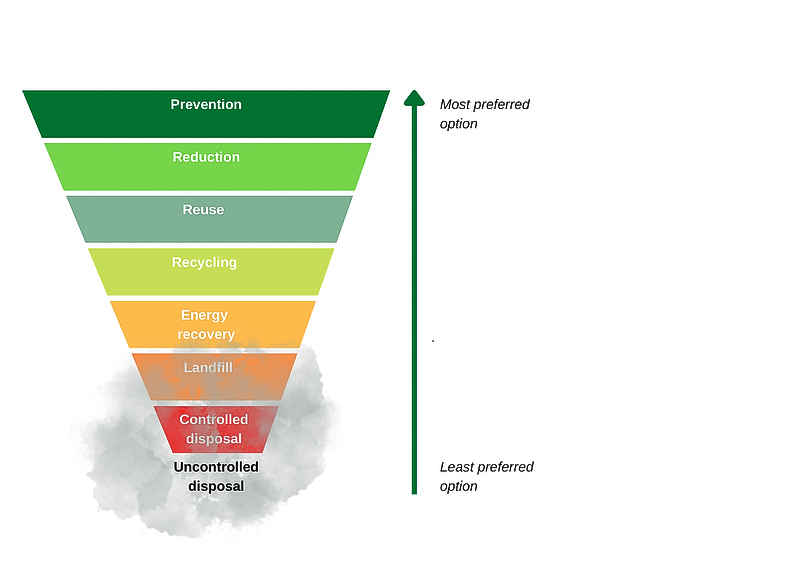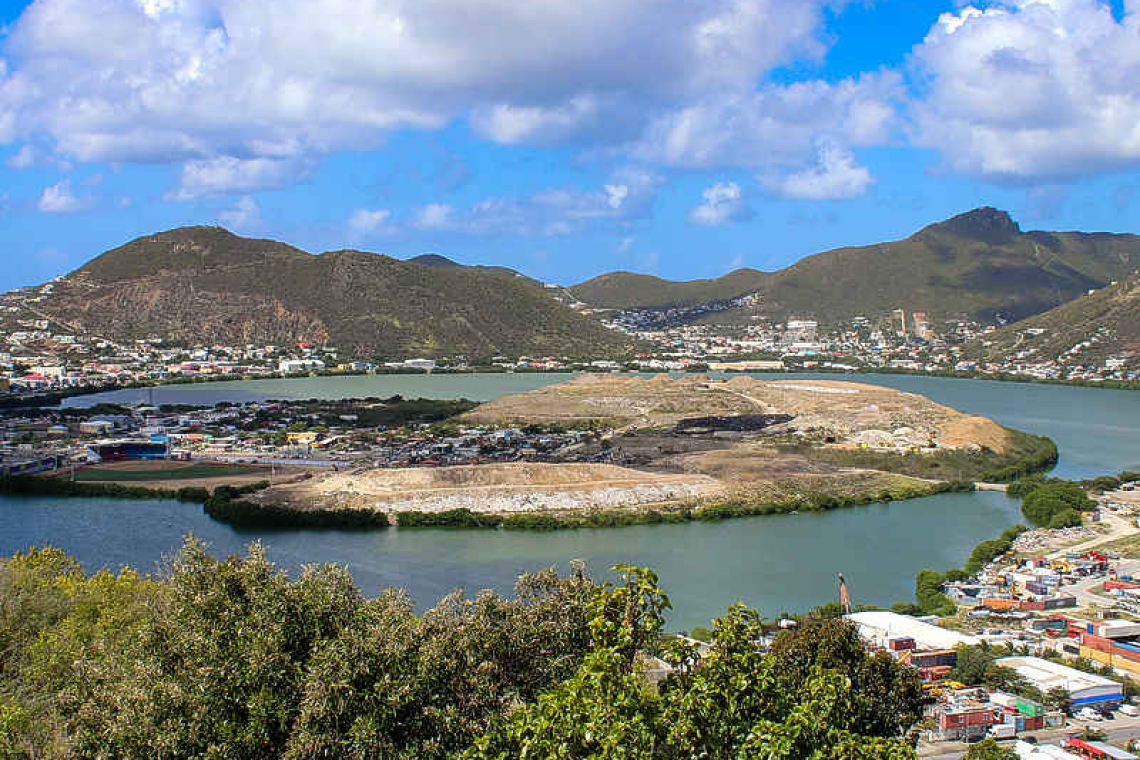A view of the landfills on Pond Island from Guana Bay Hill (NRPB file photo).
POND ISLAND--The Government of St. Maarten wants to transform the country’s existing methods of waste disposal at the two landfills on Pond Island into an integrated system of solid waste management that prioritises waste prevention, reduction, re-use, recycling and controlled, sanitised disposal.
The first steps in this process are being taken with the launch of the project “Moving to Integrated Solid Waste Management on St. Maarten” (ISWM-SXM).
In St. Maarten’s current situation, most of the solid waste collected in neighbourhoods goes to the Pond Island landfills. The country has had challenges managing the types and volume of waste disposed of there and, as a result, the main landfill’s footprint has grown considerably in the last two decades. The adjacent landfill, known as the “Irma Dump”, was intended to be a temporary solution to store debris from the 2017 Atlantic hurricane season and is quickly accumulating larger waste materials such as discarded furniture and waste from construction sites.
For St. Maarten, introducing the principles of integrated solid waste management means changing the current situation to a comprehensive system for prevention, reduction, re-use, recycling, composting and waste disposal, also known as the waste hierarchy, the National Recovery Program Bureau (NRPB) said in a press statement on Tuesday.
In this system, residents, businesses and government attempt to prevent waste from being generated in the first place and to divert as much of the generated waste as possible to other useful purposes.
“This can only be achieved by the conscious efforts of everyone by, for example, refusing single-use plastics, buying recyclable products, repairing or refurbishing old products, and recycling and composting waste materials. In doing so, the amount of non-recyclable waste streams that must be disposed of by less-preferred options – such as energy recovery, landfilling and controlled disposal – will be diminished,” it was stated in the release.
“These efforts will contribute to a healthier and less polluted environment, and will stimulate industry and innovation by creating jobs in waste collection, processing and safe disposal.”
With the project ISWM-SXM, the Government of St. Maarten is taking the first steps to realise these reforms. An inter-ministerial working group was established by ministerial decree in November 2022 to spearhead ISWM-SXM. By the end of 2023, the team will deliver a sketch of the Solid Waste Authority, advise on its financing, and advise on updating relevant legislation. To raise awareness and public engagement, a multi-annual public communication campaign will be slated in 2023.
ISWM-SXM builds on an advice of the Social and Economic Council SER in 2016, the outcomes of the forum “No time to Waste” organised by the Ministry of Public Housing, Spatial Planning, Environment and Infrastructure VROMI in 2018, and the Waste Management Roadmap which the Council of Ministers approved in 2018. Furthermore, the project uses studies conducted by the World Bank between 2019 and 2020, which proposed strategies on how St. Maarten can improve its waste management system.
The ISWM-SXM team is also drafting a vision for integrated solid waste management in St. Maarten until 2030. A public consultation meeting will be organised to gather the ideas and opinions of residents, businesses, visitors, governmental institutions and non-governmental organisations (NGOs).
The St. Maarten Trust Fund’s Debris Management Project (EDMP) has invested in improvements at the two landfills over the past three years. To help mitigate surface and underground fires, a prevalent issue in 2018, EDMP procured heavy equipment and alternative daily cover (ADC) materials and applicators for the landfills. This non-organic and non-flammable material can be sprayed onto solid waste, thereby preventing fires. It also seals cracks and air pockets that can form in areas of disposed waste that would allow underground fires to erupt on the surface.
ISWM-SXM and EDMP are now working together with complementary activities that are designed to change how St. Maarten manages its solid waste. Within the next five years, EDMP will oversee the construction of waste processing facilities near the landfill, which will identify and sort incoming waste from the country’s neighbourhoods and allow for adequate disposal methods to occur, in line with regional and international standards. These waste processing facilities are expected to be handed over to the Solid Waste Authority.
Government implements ISWM-SXM with the support of the International Cooperation Agency of the Association of Netherlands Municipalities (VNG International) and the NRPB.
EDMP is a project of the St. Maarten Recovery, Reconstruction, and Resilience Trust Fund, which is financed by the Government of the Netherlands, managed by the World Bank, and implemented by the NRPB on behalf of the Government of St. Maarten.

An illustration of the waste hierarchy.







